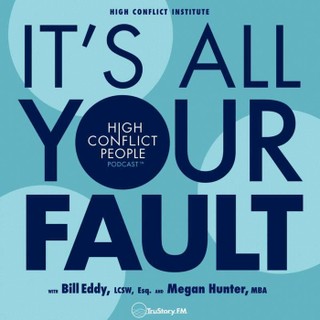Navigating Narcissistic High Conflict Personalities
In this revealing episode of "It's All Your Fault," part of the Five Types of People Who Can Ruin Your Life series, Megan Hunter and Bill Eddy explore the world of narcissistic high conflict personalities. They delve into the key traits of narcissists, the distinction between grandiose and vulnerable narcissists, and the potential connection between narcissistic personalities and domestic violence.
Recognizing Narcissistic High Conflict Personalities
Bill and Megan outline the defining characteristics of narcissistic high conflict personalities, such as their incessant need to feel superior, their sense of entitlement, and their lack of empathy. They explain how these individuals often exploit and mistreat others to preserve their grandiose self-image and how they respond when confronted with perceived challenges to their superiority.
The Two Faces of Narcissism: Grandiose vs. Vulnerable
Not all narcissists are alike. Bill and Megan explore the contrasts between grandiose and vulnerable narcissists. Grandiose narcissists tend to be more calculated and predatory in their actions, while vulnerable narcissists are generally more reactive and emotionally unstable. Grasping these nuances can be essential in recognizing and handling high conflict personalities.
Narcissism in Various Contexts
Narcissistic personalities can be encountered in various aspects of life, but some fields and occupations appear to draw them more than others. Bill and Megan discuss the prevalence of narcissists in healthcare, higher education, and the tech industry, and how these individuals can foster toxic work environments and strained relationships.
Questions we answer in this episode:
- What defines narcissistic high conflict personalities?
- How do grandiose and vulnerable narcissists differ in their conduct?
- Which fields and occupations are more likely to attract narcissistic personalities?
- Is there a link between narcissism and domestic violence?
- How can you identify and cope with a narcissistic high conflict personality?
Key Takeaways:
- Narcissistic high conflict personalities constantly strive to feel superior and entitled.
- They often lack empathy and manipulate others to uphold their inflated self-image.
- Grandiose narcissists are more calculated, while vulnerable narcissists are more reactive.
- Some fields, like healthcare and higher education, may attract more narcissists.
- Recognizing the differences between narcissistic personalities can aid in identifying and managing them.
This episode offers valuable insights into the intricate realm of narcissistic high conflict personalities. Whether you're navigating a relationship with a narcissist in your personal life or at work, Bill and Megan's expertise and practical guidance can help you manage these challenging interactions and safeguard your well-being.
Links & Other Notes
Note: We are not diagnosing anyone in our discussions, merely discussing general patterns of behavior.
- (00:00) - Welcome to It's All Your Fault
- (00:38) - 5 Types of People Who Can Ruin Your Life Part 6
- (01:18) - Narcissistic HCPs
- (02:48) - Social Impairment and/or Internal Distress
- (04:55) - See Themselves as Superior
- (12:02) - Feeling Entitled to Special Treatment
- (13:16) - Lacking Empathy
- (21:12) - Stats
- (24:06) - The Two Types
- (27:17) - Lying
- (29:41) - Apologizing
- (32:00) - Domestic Violence
- (34:10) - Stalking
- (35:00) - Letting Go of Relationships
- (39:11) - Signs If It’s Your Partner
- (43:09) - Steps to Take
- (45:29) - Reminders & Coming Next Week: A Special Guest



